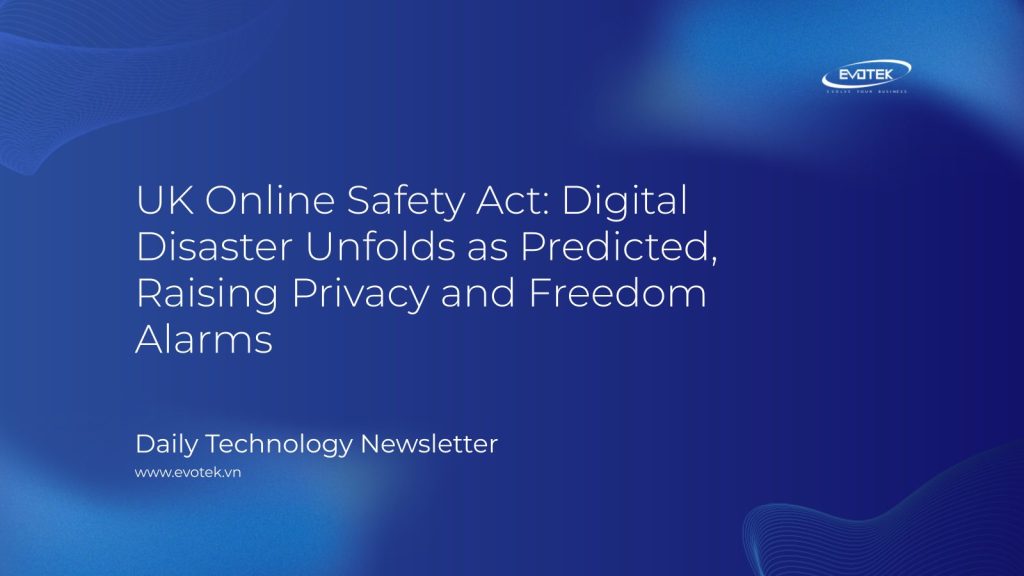Just weeks after the “age assurance” provisions of the UK’s Online Safety Act (OSA) came into force, the legislation is proving to be the catastrophic privacy and freedom infringing failure that critics universally predicted. The immediate fallout reveals a digital landscape more restricted, less secure, and paradoxically, no safer for its intended beneficiaries.
VPN Surge: The First Red Flag
One of the clearest indicators of the OSA’s problematic implementation is the unprecedented surge in Virtual Private Network (VPN) usage across the UK. Proton VPN reported an astonishing 1,800% increase in new UK sign-ups, while five of the top ten free applications on the Apple App Store in the UK are now VPN services. When a law designed to protect children inadvertently becomes a masterclass in digital circumvention for the younger generation, it underscores a fundamental miscalculation of its impact on online behaviour and internet freedom.
Unintended Censorship: Legitimate Content Blocked
The extent of content now trapped behind intrusive age verification barriers is alarming. UK users are being forced to submit selfies or government identification to access a wide array of legitimate and often vital online resources, including:
- Reddit communities dedicated to addiction recovery (e.g., stopping drinking and smoking), period health, craft beer discussions, and crucial sexual assault support forums.
- Spotify music videos flagged as 18+.
- War footage and protest videos shared on X (formerly Twitter).
- Wikipedia, the world’s largest educational encyclopedia, is even threatening to limit UK access while actively challenging the law.
The absurdity is stark: a law purportedly safeguarding minors now demands that victims of sexual assault prove their age to access support, and individuals battling addiction must undergo facial recognition to find help. The notion that such essential health information and peer support networks pose a greater risk than the invasive surveillance infrastructure created to gatekeep them is a deeply troubling conclusion by the UK government.
Crushing Small Online Communities & Empowering Tech Giants
The OSA’s impact extends beyond individual privacy, systematically dismantling smaller, community-driven websites and forums. Many have already shut down due to the insurmountable compliance costs associated with the new regulations. This disproportionately benefits tech behemoths like Meta (Facebook, Instagram), which possess the financial and technical resources to absorb these expenses. As a result, niche online communities, such as specialized hobby forums, are forced to migrate to large, commercial platforms where their content and user contributions become mere fodder for advertiser-driven algorithms, losing their original communal value and autonomy. This regulatory approach effectively centralizes online activity, creating new monopolies rather than fostering a diverse internet ecosystem.
The Privacy Nightmare of Age Verification
The age verification process itself is a significant privacy and security risk. Users are compelled to upload sensitive biometric data via selfies for facial recognition or provide government-issued IDs to third-party companies. The technical flaws are glaring; systems have been easily bypassed using screenshots from video games, highlighting their inherent insecurity. More critically, these systems create vast “honeypots” of personal data, which, as history repeatedly shows (e.g., the Tea dating app breach that exposed thousands of user selfies), are vulnerable to breaches. The collection of intimate personal details linked to online activity presents an unprecedented risk of public exposure and misuse.
Authoritarian Response and Disinformation
The UK government’s reaction to widespread criticism and increased VPN usage has been dismissive and authoritarian. Initial statements insisted the Act would not be repealed, followed by Tech Secretary Peter Kyle’s tactic of smearing critics as enablers of child predators. This intellectually dishonest approach attempts to silence legitimate policy debate by falsely associating dissent with child abuse. This is particularly egregious, given that the law does little to deter actual predators, who will simply shift to unregulated platforms, encrypted messaging, or readily accessible VPNs, while law-abiding citizens face the brunt of surveillance and restriction.
The Unintended Consequences and Broader Cautionary Tale
In practice, the UK’s Online Safety Act has achieved the exact opposite of its stated goals. It impedes adults’ access to perfectly legal and often beneficial information, compels users to create detailed, real-identity-linked digital footprints, pushes individuals towards less secure online environments, eradicates small online communities, and inadvertently educates a generation on how to circumvent government surveillance. The genuine harms it purports to address remain largely untouched, as predators adapt to unregulated spaces. This legislation stands as a stark warning for democracies worldwide struggling with internet regulation. When politicians legislate on technology they don’t fully comprehend, targeting ill-defined problems with ineffective solutions, the outcome is legislation that jeopardizes privacy, curtails freedom, harms legitimate businesses, and ultimately fails to enhance true online safety. The rapid accumulation of hundreds of thousands of signatures on a petition demanding its repeal underscores the public outcry, yet the government’s vague reassurances about “sensible enforcement” offer little genuine comfort or change for platforms fearing scrutiny.
Missed Opportunities for Real Safety
Tragically, viable alternatives for child safety were available and discussed, including increased funding for mental health support, enhanced educational programs, and stronger privacy protections that avoid mass surveillance. Instead, the UK government opted for a path maximizing state control at the expense of genuine safety and individual rights. The unfolding disaster of the Online Safety Act should serve as a critical lesson: prioritizing perceived toughness over effective problem-solving leads to laws that harm everyone they claim to protect while inadvertently empowering the very elements they seek to constrain.

 日本語
日本語 한국어
한국어 Tiếng Việt
Tiếng Việt 简体中文
简体中文